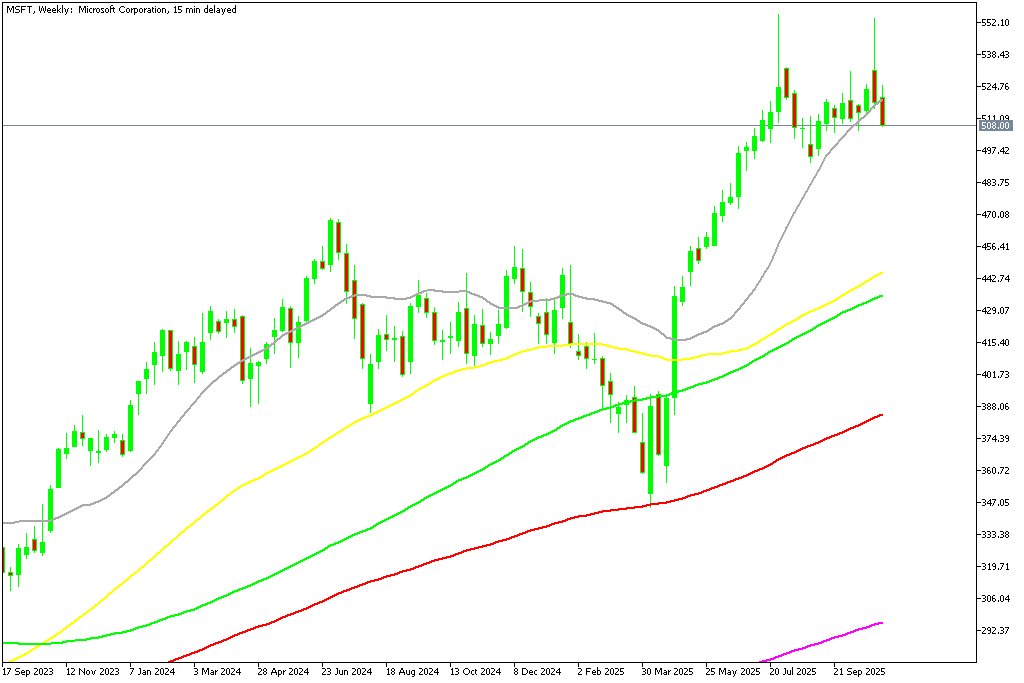MSFT Stock Breaks Support Zone: Profit Pressure, Internal Strife Undermine Microsoft
Investor optimism wanes as internal disagreements, insider share sales, and soaring AI costs affect Microsoft's once solid future.

Quick overview
- Investor optimism in Microsoft has declined due to rising AI expenses and insider share sales.
- The company's stock has dropped over 4% in a week, signaling fading confidence among traders.
- Microsoft's partnership with OpenAI is under strain, raising concerns about its competitive edge.
- Internal protests and cybersecurity issues further complicate Microsoft's outlook amidst growing ethical scrutiny.
Live MSFT Chart
[[MSFT-graph]]Investor optimism wanes as internal disagreements, insider share sales, and soaring AI costs affect Microsoft’s once solid future.
Rally Falters After Earnings Highs
Microsoft’s stock has lost its shine just weeks after reaching record highs above $555 following its upbeat Q2 results. Investors attempted to reignite momentum ahead of the Q3 earnings release, but the rally fizzled at $553.70 before reversing sharply. The stock has now dropped more than 4% in a week, closing near $507, breaking below key short-term moving averages. The loss of support signals fading confidence and growing profit-taking, with traders eyeing $468 as the next major downside target.
Technical Breakdown Confirms Bearish Shift
On the weekly chart, Microsoft briefly rebounded off its 20-SMA (gray) but quickly surrendered gains, sliding back and breaking below this key support line — a move that typically signals a deeper correction ahead.
MSFT Chart Weekly – Returning to the 20 SMA Quickly Points to A Bearish Break
The technical damage was compounded by insider activity: Vice Chair and President Bradford L. Smith sold 30,411 shares worth about $15.8 million on November 3, according to SEC filings, a move investors interpreted as a red flag amid growing volatility.
AI Ambitions Turn into a Profit Trap
While Microsoft’s Q3 earnings topped expectations — with EPS of $3.72 and revenue of $77.67 billion — the celebration didn’t last. The company’s $3.1 billion OpenAI-related expense shaved nearly $0.41 per share off profits, exposing the rising cost of its aggressive AI expansion. CFO Amy Hood warned of accelerating capital expenditures, particularly in AI infrastructure, which could further squeeze margins. Analysts now question whether Microsoft’s breakneck AI spending can deliver proportional returns.
Cracks in the AI Partnership
Microsoft’s once-vaunted alliance with OpenAI is showing strain. Reports indicate that OpenAI is exploring a chip venture with Broadcom and even considering launching a recruitment platform that would directly compete with LinkedIn, a core Microsoft property. These developments fuel concerns that OpenAI’s growing independence could undermine Microsoft’s strategic advantage and cloud dominance.
Security Breaches and Weak Hardware Sales Add Pressure
Microsoft’s reputation as a dependable tech leader took another hit after an internal data leak revealed vulnerabilities in its AI systems — a blow that raised cybersecurity concerns. At the same time, the company’s Xbox division continues to struggle, with hardware sales down 29% year-over-year, signaling weakening consumer appetite and stagnant innovation in the gaming segment.
Internal Strife and Global Backlash
Adding to the turmoil, employee protests at Microsoft’s Redmond headquarters have drawn scrutiny over its defense and AI partnerships linked to global conflicts. Demonstrations concerning civilian casualties in Gaza have intensified ethical pressure on the company just as it deepens ties in the Middle East through a $15 billion data center expansion in the UAE with AI firm G42 — a move that some critics view as contradictory.
Conclusion: Momentum Fades, Uncertainty Builds
Microsoft’s once-bulletproof growth narrative is showing cracks. Ballooning AI costs, insider selling, and mounting ethical and competitive challenges have combined to sour sentiment. While its cloud business remains a bright spot, shrinking profit margins and eroding investor confidence suggest that Microsoft’s AI-fueled momentum may have peaked — at least for now.
- Check out our free forex signals
- Follow the top economic events on FX Leaders economic calendar
- Trade better, discover more Forex Trading Strategies
- Open a FREE Trading Account



